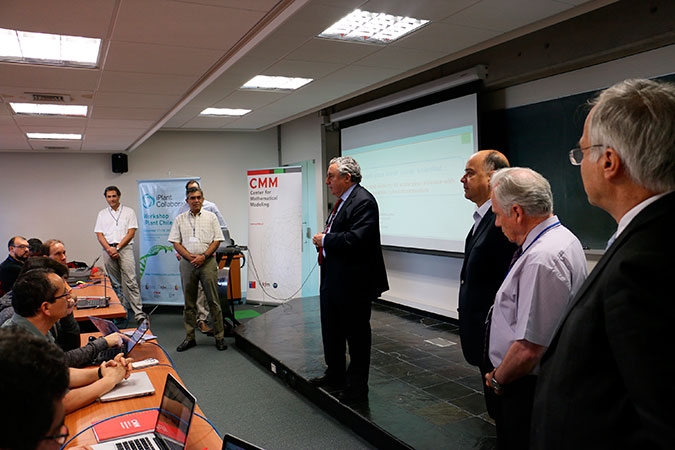The platform will give autonomy and depth to the study of massive biological data, by offering services so that researchers of the area of life sciences explore their data directly in all the stages of their work.
With the presence of Ennio Vivaldi, Rector of Universidad de Chile, alongside academics, doctoral students of the faculties of Sciences, Agronomy Sciences, Veterinary and Agricultural, Medicine, Physical and Mathematical Sciences (FCFM), INTA, and also researchers from the Center for Mathematical Modeling (CMM) of the FCFM, it was inaugurated and fulfilled the first iPlant workshop in the country.
“This activity is tremendously important, because it fits in perfectly with the vision the CMM had of playing a pivotal role, a hub, for multiple areas of the sciences in Chile» affirmed Rector Vivaldi.
For Alejandro Maass, researcher at the CMM -and one of the organizers of the event together with the Deacon of the Faculty of Agronomic Sciences, Roberto Neira, and teacher Herman Silva, from the same unit-, “iPlant can mean Chile to count, after a long time, with a platform that democratizes the exploration and analysis of biological data».
We are talking about a platform that will allow biologists, physicians, agronomists and other professionals linked to life sciences to process their data in intermediate stages, generating explorations without depending on the presence of a specialist of the informatics sciences but for the more complex processes and development.
During the workshop, Nirav Merchant and Eric Lyons, main researchers at iPlant United States, explained the philosophy of the project and the services that offer to the scientific community. The participants were also able to perform practical tests on the products offered by the initiative.
“ iPlant Collaborative’s vision is to allow researchers and educators in life sciences to use and extend the cyber-infrastructure to understand and, lastly, foretell the complexity of the biological systems and their dynamics under various environmental conditions”, explained Lyons, who defined the concept of cyber-infrastructure as storage of data, software, high performance computing and the people organized as systems that resolve problems of dimensions that would not be resolved without these elements.
Merchant highlighted the possibilities that open up for collaboration between different scientists, by saying that “iPlant is a virtual collaborative organization that allows those who have data get in contact with those who can process it and viceversa. Then, allows to make science to those who have models and to make conclusions to those who have information».
In that sense, Maass emphasized that the design of the platform gets in charge of all the problems the users have in the analysis of data, in their architecture, the management of data, the low difficulty that implies the learning of lines of command and, above all, the access to the calculation that «has been thought, and even optimized so that users have access to high performance computing correctly from the tools. And that is something important for us, because, having the National Laboratory for High Performance Computing (NLHPC) at the CMM, this maximises the use of that tool because it is already in Chile”, added the academic.
Now, the challenge is to install iPlant in the country: the options go from implementing all the tools that the platform offers in Chile until generate a structure well connected with iPlant United States. Always, considering the connection with the NLHPC as key.
This could also have repercussions in the way of teaching, explained the mathematician of CMM, opening new possibilities, emphasizing that “it will allow to order the education also in bioinformatics subjects. When things are so well organized and structured from the data, you can do much better workshops for the applicators.
Source: Universidad de Chile

